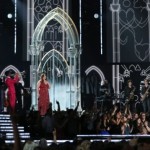The Feedback Loop is a weekly column by Luke Larsen that seeks to find God amidst the newest trends in both mainstream music and independent music.
A single listen of his debut studio album and one thing is clear: Macklemore isn’t your typical rapper.
His songs don’t usually begin with big beats and blaring synthesizers. Even his big singles usually start with something much more subtle–more vulnerable–more daring. A few spoken words or a distant piano. A somber group of horns hanging in the background. He isn’t afraid to let his flow and lyricism take center stage.
But it wasn’t just his beats and song arrangements that made me realize Macklemore and his new album The Heist was something special.
In a genre that isn’t exactly known for its progressive beliefs, this album feels vehemently brave. Where the mainstream hip hopindustry celebrates homophobia and opulent materialism, Macklemore happily encourages thrift store shopping and acceptance. But more than that, he manages to find meaning in the small things in life–the kinds of things you don’t hear a lot of rappers rhyming about.
In “My Oh My” Washington-born rapper finds a special place in his life for the Seattle Mariners and in “Wings” for a pair of Air Nikes. He feels the tug of consumerism and of “Phil Knight cheating us all”, but he also dives into the nostalgia of it — even recounting how a single baseball game changed history in his city.
As talented as Macklemore is at finding meaning in the small things, there’s no doubt that when he gets into heavier topics, he is at the top of his game. He is a tried-and-true ”socially-conscious” rapper — the newest in this long and well-documented breed of modern hip hop. In that way, it would have been easy for Macklemore spit fiery sermons about social injustice for an album. Instead, the songs on The Heist aren’t afraid to step back from the pulpit and get deeply personal on these social topics too: “When I was in the third grade, I thought that I was gay,” he raps in the song “Same Love”.
Again — if I had to call it one thing, I’d call it brave.
In that same song, Macklemore looks at the state of the country and sees a nation cowering to fear of the unknown: “America the brave/Still fears what we don’t know/And ‘God loves all his children’ is somehow forgotten,” he raps with conviction about stereotypes, hypocrisy, and gay marriage.
Seeing the state of Washington redefine of marriage left Macklemore’s proud endorsement of gay marriage in “Same Love” ringing in my mind. Election day was just one week ago and it remains a big moment in the lives of Americans–not only for Macklemore and his Capitol Hill buddies–but for the entire country. There’s no doubt that as some celebrate rights being taken back, others will see moral depravity stepping forward. But the most interesting thing about Macklemore’s argument is that for him, the issue of legalizing gay marriage is as much about hate speech and the oppression of rights as it is about the unconditional love of God.
I’m usually quick to write stuff like this off as being too preachy or hotheaded, but Macklemore tackles the issues with a degree of subtlety and nuance that we as Christians could learn a lot from. He understands the line between criticizing the Church and recognizing who the true God is. He understands the different between politics and people. He also gets that as important as laws and governance are, true change can only come from the individual. Later in the song “Same Love”, speaking of the gay marriage referendum, he raps, “No law is going to change us, we have to change us/Whatever god you believe in, we all came from the same one.”
Because to Macklemore, it’s not only about a law. It’s about an attitude. It’s not about determining whether or not homosexuality is a sin–it’s the posture of our hearts toward our neighbors. In a time when a lot of weight is placed on passing a certain law or electing a certain person, this can be all too easy of a thing to forget. Loving our neighbors as ourselves isn’t always as easy as filling in a bubble on a ballet. If anything real is going to change in the world, it has to start on the inside — and it all starts with understanding how deeply God loves the world. Everything else, political views included, is just a side note.












